#to be clear: i don't think this is an actual flaw of the game but i do think it played a part in why it wasn't a hit like ME 1-3
Text
in general if your response to a certain type of character, especially any form of minority, is literally any variation whatsoever of "that doesn't exist/wouldn't be allowed in this setting" you're being a bigoted piece of shit. just to be super clear. and because my adderall is in full effect rn i will even do you the favor of going over some reasons why your reasoning is not only flawed and inaccurate to begin with, but extremely harmful to entire groups of people you claim to care about.
"that doesn't exist" first of all, who fucking cares if a piece of media has never depicted a lesbian or a nonbinary person or a black person in xyz region/world? just because the creators didn't do it doesn't make it Canonical Law. also, regardless of how fantastical and fictional a setting is, its audience will ALWAYS be from planet earth where lesbians and nonbinary people and black people exist, and those people's feelings and their deservingness to see and put themselves in their favorite stories IS, in fact, more important than some white-ass cishet make believe world.
"it wouldn't be allowed" subtler issue, but an issue nonetheless. just because the setting is hostile TO certain groups of people does not mean those people do not exist there. ask yourself, what is so important to you about certain kinds of people either not existing period, or having to be miserable (closet themselves, conceal certain features, etc), in a given setting. why is that so important to you. why do you think these people can only exist if they hate themselves and/or live their lives suffocated by the world around them. why is it so "lore incompliant" or "immersion breaking" to you. why are you so concerned with upholding real or perceived prejudices in a fictional society if you claim to care about the real people who these prejudices affect. "realism"? see point one.
NONE of the reasons you make up to justify your reinforcement of real world bigotry in a pretend world are even reasons that would ACTUALLY bar xyz group of people from existing in said world. ishgard only shut its gates to the rest of the world for 15 years before ARR. old sharlayan accepted people from tural into its closed society. the ancients could literally conjure up whatever the fuck they wanted inside and outside their bodies. fantasias are a canonical item in the game, as per the quest that literally talks about them and then gives you one. there are HUNDREDS of perfectly lore compliant ways any given type of person could be in any given setting. but more importantly, people shouldn't need to justify why things like sexuality or skin color CAN exist in a given setting, because if you're not harboring some very bigoted ideas about how minorities are allowed to or "supposed" to exist, you don't fucking care about shit like this. it's stupid, inaccurate, and most of all, just plain cruel to the very real people behind these characters.
racism, transphobia, etc already exist in staggering abundance in the real world; you do not need to enforce that cruelty in a random fucking video game unless you have some very fucked up feelings about those groups of people festering in your brain. if you're not a member of those groups, shame on you, do better to support your fellow human beings. if you ARE a member of those groups, i am so fucking sorry the world has rotted your sense of self so deeply as to make you believe you can only exist in misery. i really, sincerely hope you're able to work through that and know that your existence is an inherently joyful, beautiful thing, and people like you deserve to get to exist peacefully, everywhere in the real world and in any and all fictional settings. i know finding worth in ourselves is too often an extremely difficult process, so i ask instead that you start with others like you. be kind to them, support them, find things about them that you admire, and try to see yourself in them. you deserve to get to heal from the insidious, evil things this world has poisoned your heart with.
29 notes
·
View notes
Text
The more time I sink into andromeda, the more I suspect the biggest reason it ultimately failed commercially was because of the massive tonal shift I've already mentioned, and how there was probably a pretty big chunk of original trilogy players who simply no longer fit as a demographic, while the game failed to reach the people who might’ve enjoyed it.
The original trilogy, much as I love it, feels a little bit like a wishfulfillment power fantasy for a very obvious demographic. Almost all women are overtly sexy in design and the f/f relationship in the first game seems to be written along the guidelines of 'what would a straight man find hot'; you play as someone cool and confident and powerful, the most specialest human ever, and maybe you aren’t always respected but YOU and the NARRATIVE always know you're right and you get to be rude to and sometimes punch/murder people who disagree with you so it’s fine. The game then salvages all this by means of genuinely well-written characters and arcs, really cool sci-fi tech and lore, a fantastic story, and meaningful and hard-hitting choices and consequences (which also allow and often encourage you to steer away from that exact macho ideal).
Enter andromeda. Instead of being a super powerful supersoldier from the start, you're the kid of one. You barely know what you're doing. Everyone doubts you, including yourself. You don’t get the assuredness of knowing you are Right and Cool that you have as Shepard. You don’t demand that same respect. And I'm sure there are a lot of people who hated that.
#mass effect#mass effect andromeda#to be clear: i don't think this is an actual flaw of the game but i do think it played a part in why it wasn't a hit like ME 1-3#andromeda has plenty of flaws#some similar to the original trilogy and some all of it's own#the biggest being that it fails to take the same big swings and risks as the trilogy#and therefore feels a lot less hard hitting and rewarding#had it succeeded in that emotional core the way the trilogy did i actually think that original demographic would've enjoyed it too#in a similar way to how i adore the trilogy despite not being the intended target audience. it has enough substance to carry past its flaws#nella talks
610 notes
·
View notes
Text
I think a lot of folks in indie RPG spaces misunderstand what's going on when people who've only ever played Dungeons & Dragons claim that indie RPGs are categorically "too complicated". Yes, it's sometimes the case that they're making the unjustified assumption that all games are as complicated as Dungeons & Dragons and shying away from the possibility of having to brave a steep learning cure a second time, but that's not the whole picture.
A big part of it is that there's a substantial chunk of the D&D fandom – not a majority by any means, but certainly a very significant minority – who are into D&D because they like its vibes or they enjoy its default setting or whatever, but they have no interest in actually playing the kind of game that D&D is... so they don't.
Oh, they'll show up at your table, and if you're very lucky they might even provide their own character sheet (though whether it adheres to the character creation guidelines is anyone's guess!), but their actual engagement with the process of play consists of dicking around until the GM tells them to roll some dice, then reporting what number they rolled and letting the GM figure out what that means.
Basically, they're putting the GM in the position of acting as their personal assistant, onto whom they can offload any parts of the process of play that they're not interested in – and for some players, that's essentially everything except the physical act of rolling the dice, made possible by the fact most of D&D's mechanics are either GM-facing or amenable to being treated as such.*
Now, let's take this player and present them with a game whose design is informed by a culture of play where mechanics are strongly player facing, often to the extent that the GM doesn't need to familiarise themselves with the players' character sheets and never rolls any dice, and... well, you can see where the wires get crossed, right?
And the worst part is that it's not these players' fault – not really. Heck, it's not even a problem with D&D as a system. The problem is D&D's marketing-decreed position as a universal entry-level game means that neither the text nor the culture of play are ever allowed to admit that it might be a bad fit for any player, so total disengagement from the processes of play has to be framed as a personal preference and not a sign of basic incompatibility between the kind of game a player wants to be playing and the kind of game they're actually playing.
(Of course, from the GM's perspective, having even one player who expects you to do all the work represents a huge increase to the GM's workload, let alone a whole group full of them – but we can't admit that, either, so we're left with a culture of play whose received wisdom holds that it's just normal for GMs to be constantly riding the ragged edge of creative burnout. Fun!)
* Which, to be clear, is not a flaw in itself; a rules-heavy game ideally needs a mechanism for introducing its processes of play gradually.
7K notes
·
View notes
Text
The Watcher's telescope view is a social commentary and here's why
Ok so let's set some things right first.
City of Tears is amazing.
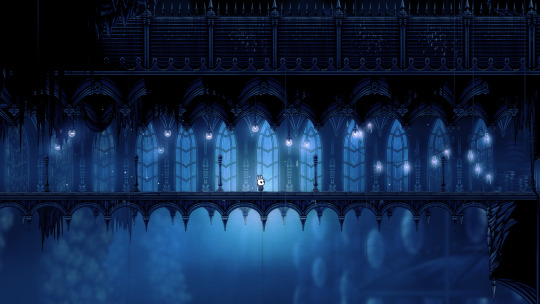
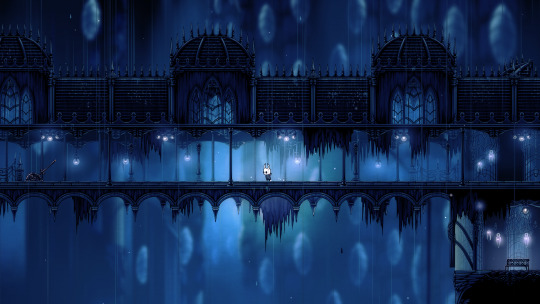
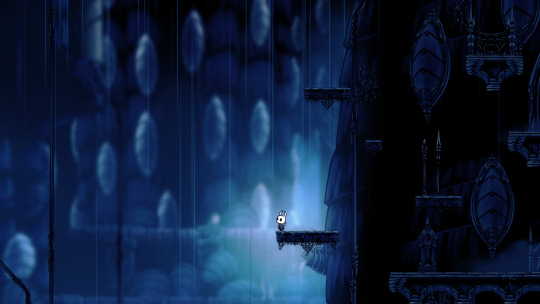
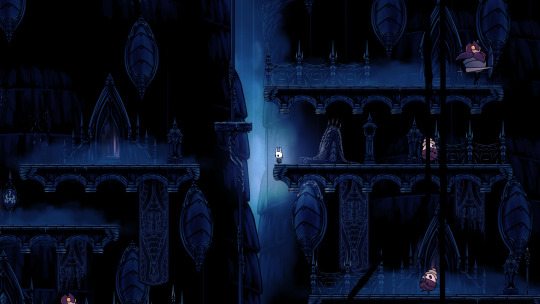
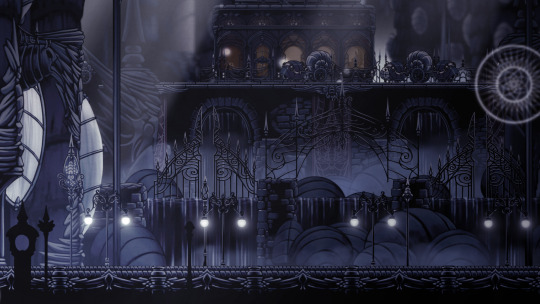
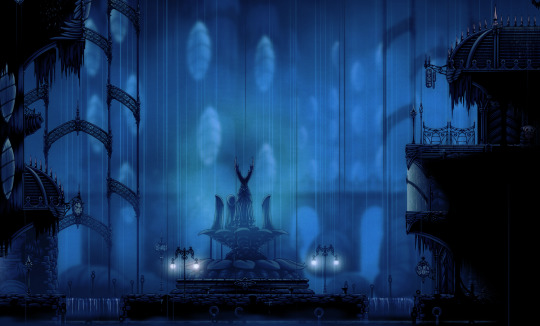
(Yes, Pale Court is also an amazing mod)
I've played Hollow Knight many times, and City of Tears is probably the one location I never get tired of. The scenery, the lore, the room layout, the music, the atmosphere - it's all perfect. It's the culmination of Halllownest's beauty, the peak of the game's art style, and the narrative's most essential location. City of Tears is the heart of Hollow Knight.
This game is a story about a Kingdom and its death, a tragedy of a society that was built on dreams of light but ultimately was consumed by the light so much that darkness became its only hope. And City of Tears stands at the center of this story. So it's fitting that the themes of corrupted dreams, society flaws, and dark hopes are what shape the lore and atmosphere of this beautiful, gorgeous location.
Did you ever notice that the tears of this Kingdom are dark despite them originating in a glowing blue lake, and the waters that flood the streets are almost as dark as the void in the Abyss? Do you ever think about how the vibrant blue color of the City is basically a culmination of how the color blue is presented in other locations (Howling Cliffs, Forgotten Crossroads, and later Royal Waterways being more of a remix of it), and how it's tied to the very essence of Hallownest (and how Resting Grounds, the location that contains Blue Lake and also uses a bright blue color, represent the very foundation of Hallownest's history, that being Seer's story about the Moth Tribe's betrayal that started the war between Pale King and the Radiance)? Do you feel like Soul Master basically represents the thunder and the lightning in this never-ending rain? Do you get it????
Anyway yeah, there are many things that can be said about City of Tears, and this is hopefully not the last time I make a post about it. What I want to talk about here is the City's society.
Basically, Monomon said it better than anyone could:
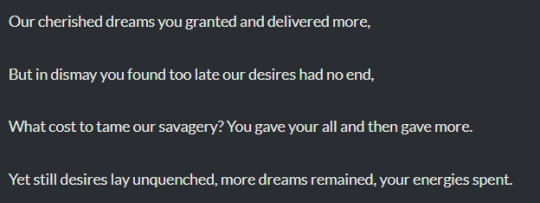
It's a very complicated topic. The narrative basically explores the inner mechanisms of a free mind, how its primary need is finding a purpose, and how its purpose turns out to be a constant need of... something. Anything. As long as there is something to want, a free mind will want it. As long as there is something to yearn for, something to enjoy, something to dream about, our minds are going to move in its direction, never wanting to stop. Because a stasis is worse than death. Because a world without dreams is an empty world.
But then again, isn't constant yearning another instance of, well, constance? If dreams never end but also never evolve, doesn't that create another kind of stasis?
Like I said, it's very complicated. Let's go back to what I was getting at in the first place. What I actually wanted to say is this:
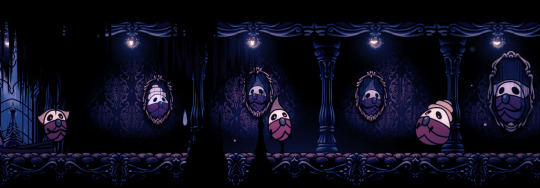
Theese guys fucking fucked up as a society.
It's classic dystopian shit (or maybe I'm using the wrong word, but you get the point). Rich people are living in luxury while the rest are suffering. They're making gold a fucking religion and are seeing it as the only beauty in the world. The corrupt upper class are using heavy gatekeeping on the lower class.
Literally.
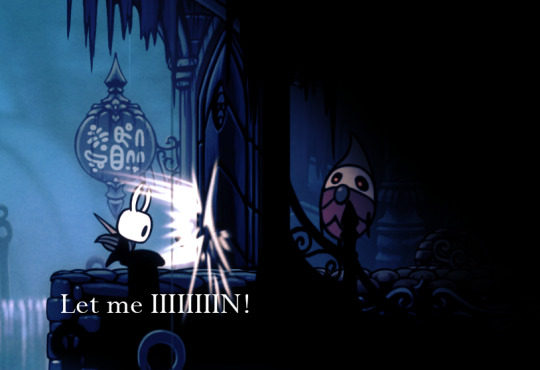
What's interesting is that, at first, we barely see any lower class bugs in the City. There's suspiciously few regular husks in this location, compared to how many rich guys are on the eastern side. But then we get to Soul Sanctum and it all starts to make sense.
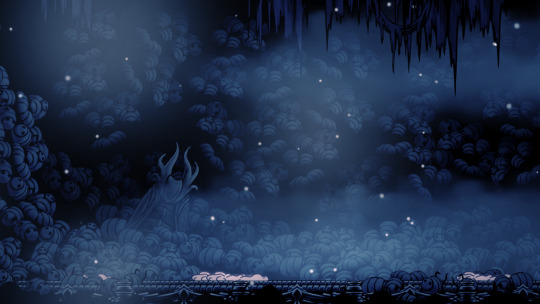
There are no red cloaks in those corpse piles. Only the poor were killed for those experiments. It can't be a coincidence. It's straight-up elitism-based genocide (again, I don't know if I'm using the right terms, correct me if there's a better way to say that, but the point is clear).
Also, see how many streets are flooded on the western side in comparison to the eastern side.
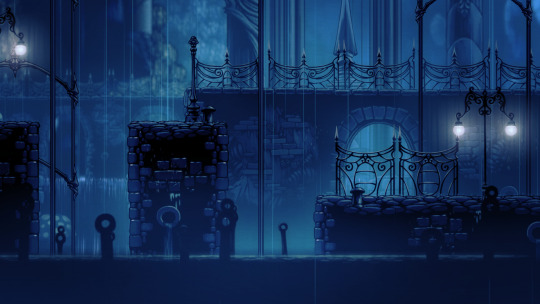
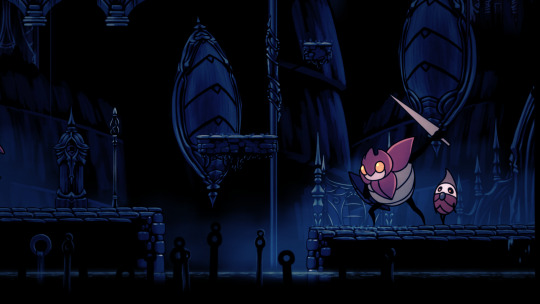
Point is, the bugs that ruined the kingdom by always wanting more (what Monomon wrote about) are most likely theese rich ones. It's a very fitting thing for this dystopian narrative: neverending greed that leads to the downfall of a civilization.
There's a note in the Hunter's Journal that describes it in the best way possible:
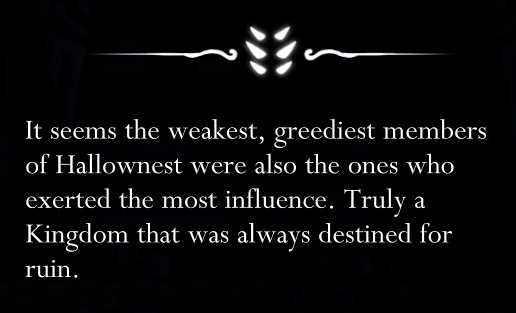
For every location in the game, there is a place that functions as the center of its essence, its narrative heart, the culmination of its themes. For Queen's Gardens it's the White Lady's cocoon, for Greenpath it's the Lake of Unn, and for City of Tears (or at least its eastern part, the one with the upper class) it's the Watcher's Spire. The tallest building of the great capital. The home of (evidently) the most rich and influential bug of the City's high society. Literally the top of this social hierarchy.
He is also arguably the most mysterious dreamer out of all three. I mean, why does he have only one eye? What type of bug is he? How did he get this much power? Does he really have some kind of connection with the Collector? Is he a motherfucking fluke? Why does he seem to have an obsession with serving the King?
That last question is kinda answered by the cut content though.

That last sentence is kinda confusing. Is it regret? Is it humility? Is it pride in his sacrifice? In any case, here we see that Lurien actually knew that the Pale King was literally a god, and desired to worship him, like any other bug yearns to worship some kind of deity. So while other bugs of Hallownest worshiped PK because he was a monarch, albeit a godlike one (for all they knew he could be just an extraordinary bug, but a bug nonetheless), Lurien worshiped him as an actual god. And the intricacies of worshiping a god are one of the central themes of the game. From the moth tribe's betrayal of Radiance leading to the birth of the Infection to the Godseeker's shenanigans leading to the birth of the Shade Lord - the game makes multiple statements about gods, religious devotion and the semantics of divine power. Just that one idea that a god takes its power from the ones that worship it deserves its own post - heck, it deserves its own book.
So yeah, Lurien's devotion to the King is an important part of the story. He sure is an important character in this narrative. He also got a cool house. Being able to observe the entirety of the Hallownest's capital is badass.
But there's one thing I find odd about all that, and it's the moment we get to actually look through his legendary telescope.
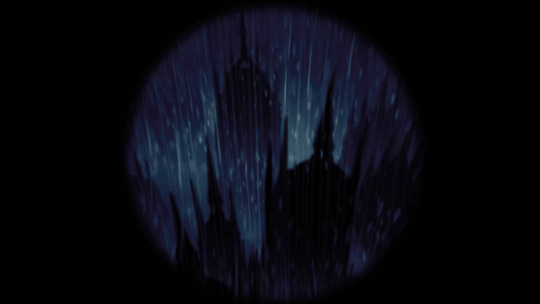
Is it just me, or does this feel kinda... Underwhelming? Almost disappointing? I mean, don't get me wrong, I love this view, it's beautiful, and I would certainly love to be able to see something like this with my own eyes irl, but, looking at this picture, I can't help but wonder...
Did he actually see anything from up there?
In cut dialogue, Lurien talks about how he loves the City's streets, and his hidden lore tablet contains words about his love for bugkind, but... I see neither any streets on this image, nor any bugs (that are not vengeflies). Only spiked rooftops and rainy fog, clouding the view of the actual City.
And sure, the Spire has many windows and even had multiple watchers who were helping Lurien with overseeing the capital...
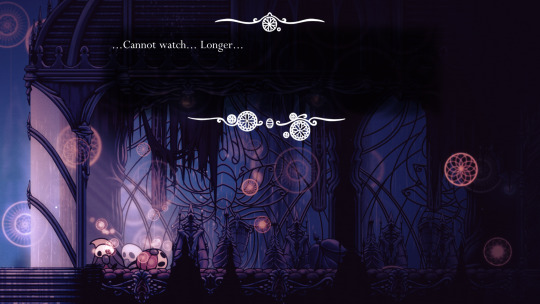
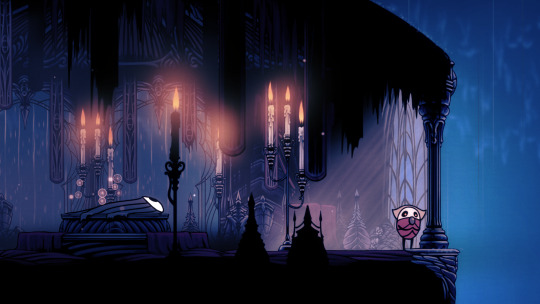
But his own spot was always this one.
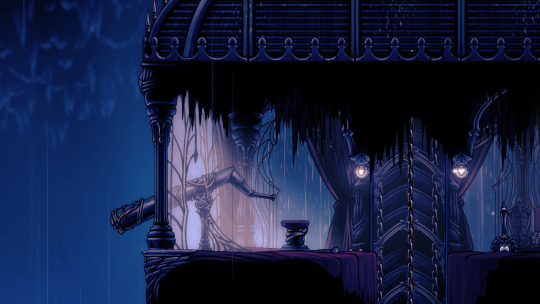
His telescope was sealed in one place, letting him see only a small portion of the City and its life. Almost like his own worldview was stuck in one perspective.
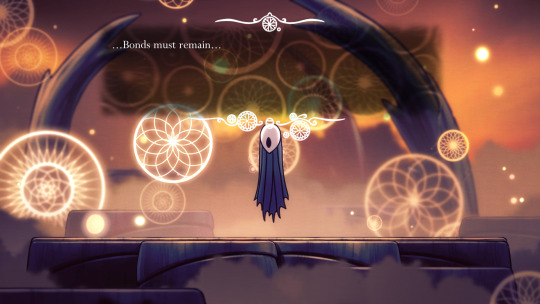
Notice the wording here. It's not "The Seals must remain". It's "Bonds must remain". He's not thinking just about the Seals containing the Infection. He's thinking about the whole Kingdom needing to stay unchanged. His dream is the stasis that the Knight (and also Monomon, Hornet and, in a sense, even Radiance) want to end. The stasis that the Pale King wanted to create in order for his Kingdom (and therefore himself) to be eternal. The stasis that would allow for both Pale King and Lurien's worship of him to remain forever.
But there is always a cost to ascending higher than others, and it's that you can no longer see what's going on below or who's suffering down there. I think Lurien, sitting atop the tallest tower, was actually detached from the struggles of regular bugs. He and his Spire are the culmination of the City's upper class' ignorance towards the ones who were below them on the social hierarchy. A dreamer who dreamt of watching over the very heart of the holy civilization lived so high up he could no longer see his beloved world in its complicated, detailed entirety – and the tears of the stasis created by those like him only blinded him more.
All those flooded streets, those broken buildings, those empty halls, those starving bugs, those sealed doors - even though he watched over them, he couldn't see them.
I'm pretty sure Lurien didn't even know about the Soul Master's experiments, despite the fact that the Soul Sanctum was located right next to his Spire.
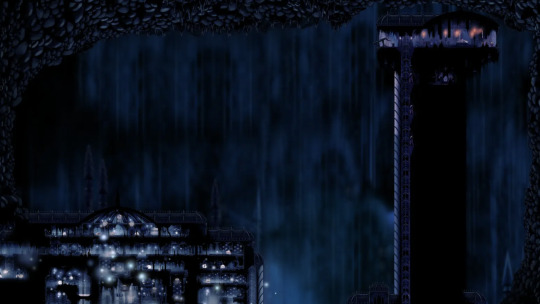
Or maybe he knew but chose to turn a blind eye to it (pun intended).
But it's kind of poetic, isn't it? It's the beauty of the tragedy of this game's characters. A Beast who had to surrender everything to the opposing civilization. A Teacher who could no longer teach. A Watcher who couldn't see the truth.
And all that makes me wonder... How much suffering could the Pale King see, standing on that platform at the top of the Abyss, facing away from the pit where his children died?
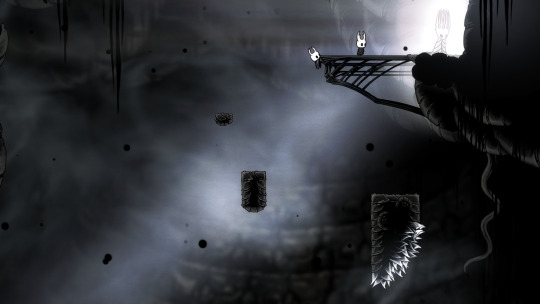
TL;DR: Lurien's point of view was too high up to actually see what was truly going on down there, both literally and metaphorically. His desire to worship the Pale King made him ignorant of the struggles of regular bugs. Similarly, the extreme elitism of the high society of Hallownest lead to ignorance, discrimination and greed, which ultimately caused the sprawl of the Infection. This side of Lurien's story might also parallel the Pale King's with his ignorance towards the discarded vessels.
TL;DR²: Eat the rich
#hollow knight#hollow knight theory#hollow knight lore#lurien the watcher#city of tears#hallownest#pale king#monomon the teacher#soul master#character analysis#social commentary
304 notes
·
View notes
Note
Can i request for any twisted wonderland characters that's fit x reader who don't know how to cook
yeah, of course!
Some of these characters have shorter parts because I added every character in the game, minus side characters such as (Artemiy Artemiyevich Pinker (Che'nya), Rollo Flamme, et cetera)
Also! If there are any inadequacies with grammar, I apologize, I'm at a friend's house while i'm writing this and I'm very easily distracted.
If it's not obvious, I'm a sucker for soft Sebek
Ortho is strictly platonic!
And Reader can be viewed as either Yuu or not!
@nisobird because there's Azul
Warnings ;; None
Relationship ;; Romantic
Type ;; Headcanons
Heartslabyul
Riddle Rosehearts ;; Heartslabyul Housewarden ;; Second Year
Riddle's world comes crashing down, in all honesty.
The boy was raised with the ideal that a partner is supposed to be at least a decent cook, but you are the exact opposite.
He will eat your food only to be nice.
Even though he can't cook all that well himself, he'll try to suggest ways to make it better even though none of his suggestions really, truly help the awfulness of your cooking.
Let's just hope you don't end up cooking for his mother.
Trey Clover ;; Heartslabyul Vice-Housewarden ;; Third Year
Trey is quite literally the sunshine to your moonlight, your sky to your ground.
You two are total, clear opposites.
He can cook almost anything without flaw, especially pastries and sweets.
He will panic if he ever sees you in the kitchen, trying to cook something.
He'll subtly take over for you, slowly taking more and more control of the kitchen.
Cater Diamond ;; Heartslabyul ;; Third Year
Cater would not care one single bit.
He is taking so, so many photos and posting them on Magicam, he does not give two shits whether it looks amazing, or absolutely terrible.
He will post it, specifically because you're his partner, you're his significant other.
And yes, he will shove it down his throat even if he needs to vomit it up later.
Ace Trappola ;; Heartslabyul ;; First Year
Ace can't cook, not one bit.
He's also very weird about his tastes.
He'll eat pickles and ice cream but he probably won't eat a single slice of cheese.
He'll eat anything you make at all whatsoever, unless there's cheese. (I headcanon he absolutely hates cheese, don't ask why)
He'll watch you cook and won't even interfere.
He does notice how bad your cooking is but he won't say or do anything about it because he genuinely does not care.
He'll even tell you it's actually good
Deuce Spade ;; Heartslabyul ;; First Year
Deuce doesn't even notice how bad it is, and if he did, he wouldn't even care.
He'll anything and everything, minus bell peppers.
He cannot, and will not, eat bell peppers.
He hates the taste, the texture, everything about bell peppers is everything he hates in all of Twisted Wonderland.
He tends to not watch you cook and has no reason for it.
Savanaclaw
Leona Kingscholar ;; Savanaclaw Housewarden ;; Third Year
Leona's not exactly shameless when it comes to meats, despite any sort of meat being among his absolute favorite foods.
He's not very picky about meats though. Just as long as it's cooked decently, and seasoned alright, he's fine.
Despite being a literal prince, he does not have a prince's palette.
He'll literally eat raw meat if it suits his needs
Of course, that's mostly because of the lion beastman part of him
Ruggie Bucchi ;; Savanaclaw ;; Second Year
Ruggie is literally shameless, make him anything and he'll eat it.
Just as long as it's not rotten, he'll eat quite literally anything.
He's not the greatest cook, but he'll help in any way he possibly can.
He'll most definitely bring your food to the kids in his neighborhood, no matter how terrible it is.
He wants to make sure they're fed, and he's happy when you're willing to cook.
He never tells you if he genuinely thinks you're food is bad, he'll end up feeling terrible and he knows that so he won't say a thing about your cooking.
Unless it's any sort of praise.
Jack Howl ;; Savanaclaw ;; First Year
Jack isn't entirely picky, but he's not the biggest fan of your cooking.
Being who he is, he'll feel bad for even thinking that your food is bad.
Also being the honest man he is, he'll sadly point it out to you, admitting his wrongdoing.
He's a big sweetheart, so he'll try to be as kind to you as he can, no matter how you end up reacting.
Octavinelle
Azul Ashengrotto ;; Octavinelle Housewarden ;; Second Year
Given that Azul grew up with his mother owning a restaurant, and he himself owning a restaurant, he's a bit... iffy over your cooking skills.
Of course, he'll always be nice when he brings it up. You're his significant other after all.
He'll point it out and he may give you some of his mom's recipes to help you follow along.
He helps you cook much more than he used to, letting you have most of the control, but he will come in if he sees you do something wrong.
Jade Leech ;; Octavinelle Vice-Housewarden ;; Second Year
Jade finds you and your cooking very, very entertaining.
He doesn't ever actually help you unless he finds you cooking mushrooms and.... screwing them up.
After that, he's immediately on your case and helping you cook.
Within the next two or three weeks, you're an absolute master chef.
Especially with mushrooms. By time Jade is done with you, you're more than likely a better chef when it comes to mushrooms than he is.
Floyd Leech ;; Octavinelle ;; Second Year
Floyd thinks you are the most entertaining human he's ever met.
Like some other people, he doesn't think your food is bad, just that it's so unbelievably entertaining and unique.
He actually doesn't try to help your cooking or change it or buy you anything new.
He simply watches the chaos of your cooking unfold, while occasionally adding his own, odd concoction to the mix.
And he will eat your food, no matter what you put on his plate, or what you put in the odd concoction you call your cooking.
Just don't add any shiitake mushrooms, he begs of you.
Scarabia
Kalim Al-Asim ;; Scarabia Housewarden ;; Second Year
Kalim more than likely trusts you enough to not have Jamil test the food you give him.
The only way Jamil would let Kalim eat your food is if Jamil himself trusted you.
So, if Jamil trusted you, Kalim would more than happily eat your food himself.
He probably wouldn't care if your food was the best food in the whole of Twisted Wonderland, or if your food is the worst thing in all of Twisted Wonderland.
He'll eat it happily and won't complain one bit.
Jamil Viper ;; Scarabia Vice-Housewarden ;; Second Year
Jamil, if he truly trusts you, will eat small bits of your food and will help you cook every single time you step in a kitchen.
He won't completely take over like Trey would, but he will guide you in every single way, subtle or not.
Once you get better and better, he'll eat your food more and more.
He'll take over for you at any time and finish the cooking for you, if that's what you'd like, all you'd have to do is say the word.
Pomefiore
Vil Schoenheit ;; Pomefiore Housewarden ;; Third Year
You're going to make the Vil Schoenheit break out. And that's a feat, especially considering his rigorous skincare routine.
He won't eat any of your food, and he will flat-out tell you, in a relatively nice tone of voice, that your food is not exactly good.
If he realizes that it hurts you, he'll try to find ways for your cooking to taste relatively better, whether it be buying you new utensils, or buying you cookbooks or any other things like that.
He promises you that he never meant to hurt you, he just wants to... help.
Rook Hunt ;; Pomefiore Vice-Housewarden ;; Third Year
Oh, Rook does not care. He genuinely thinks that your cooking is beautiful and wonderful in every single way possible.
He will eat your food and compliment you even if you put whole-ass children's toys in your food.
He'll buy you whatever you need for your cooking without you even need to ask him, he's kind of a freak like that.
Epel Felmier ;; Pomefiore ;; First Year
Epel is very in the middle, he's fine with your bad cooking just.... don't make him eat it because he will act like a toddler having to eat vegetables.
Or, that's what he says he won't do.
He says he'll be all manly and eat it like a man, but you know for a fact that he won't and he will act like a little kid.
Ignihyde
Idia Shroud ;; Ignihyde Housewarden ;; Third Year
Idia barely eats as it is, so when you bring him food, his hair will immediately turn pink and he'll try to hide his face by tightening his hood over his head.
He won't care whether it's bad or good, he'll only care about the fact that you actually... brought him food.
Of course, Ortho does so all the time, but it's different when your significant other brings you a whole meal because they don't want you to starve.
Once again, he doesn't care whether it's good or bad, he'll shove it down his throat either way.
Ortho Shroud ;; Ignihyde ;; First Year
Ortho can't exactly eat, given that he's both a robot and a machine.
But he'll look up recipes and help you cook and help you get as best and as good as you can get.
He'll always help, and use every single upgrade he's ever got put into him by his big brother to help you cook as best as you can.
Diasomnia
Malleus Draconia ;; Diasomnia Housewarden ;; Third Year
Oh, boy. Malleus is scared that he has another Lilia on his hands. Of course, your food is not as bad as Lilia's, but it's still not, for lack of a better word, good.
He will eat it, but he'll compliment and praise your cooking in a very... odd way.
He'll compliment you, yes. But he'll also add in some, not-so-subtle ways you can improve.
Don't tell him, he genuinely thinks his attempts at helping are extremely subtle, when they are absolutely not.
Lilia Vanrouge ;; Diasomnia Vice-Housewarden ;; Third Year
Lilia, like Rook, Kalim, and Deuce, won't even notice that your food is bad.
And that is mostly because he, himself is a bad chef.
He's such a bad chef he can't even tell when foods are actually bad.
Even if he could tell that your food was not good, he still wouldn't care because he just loves you far, far too much to even think of pointing it out.
Silver Vanrouge ;; Diasomnia ;; Second Year
Silver is internally sobbing. First, his Father, and now, his significant other.
He's very sweet about telling you ways you can improve.
He actually does this with his father, too. But you're the only one who picks up on it, Lilia, sadly, does not.
Silver tries his absolute hardest to help, but he eventually succumbs to his sleep, but he always profusely apologizes afterward.
Sebek Zigvolt ;; Diasomnia ;; First Year
Sebek is oddly much sweeter about it than you'd ever expect.
He doesn't yell, but he does let you know that it doesn't taste good.
He explains ways you can fix it, despite he himself not knowing how to cook all that well.
He explains everything he knows about cooking to try and help you.
If Sebek manages to view a human as a significant other, or partner, he will dote on your every need or want in the sweetest way that you'd never, ever expect from him.
He's very sweet as he helps you cook, making sure that you do everything to the best of your genuine ability.
#Twst wonderland#twisted wonderland x reader#twisted wonderland#malleus draconia x reader x lilia vanrouge#lilia vanrouge x reader#silver x reader#sebek zigvolt x reader#ortho shroud#idia shroud x reader#vil schoenheit x reader#rook hunt x reader#epel felmier x reader#kalim al asim x reader#jamil viper x reader#azul ashengrotto x reader#jade leech x reader#floyd leech x reader#leona kingscholar x reader#ruggie bucchi x reader#jack howl x reader#riddle rosehearts x reader#trey clover x reader#cater diamond x reader#ace trappola x reader#deuce spade x reader#romantic x reader#x reader#anon ask#asks
244 notes
·
View notes
Text
i've been seeing a lot of falsettos posts recently deconstructing the fandoms beliefs and firstly
holy fuck thank you, i try to steer clear of fandom (and fandom-izing thereof) drama but this is getting a lot more visible recently so here's some little tidbits for you
whizzer brown is not an unflawed character!
okay so i haven't seen enough dissecting this but!!! in the chess game!
the whole point of marvin using that game to determine the ending of their relationship is because he suspects whizzer is constantly deceiving him and wants to prove it.
whizzer LITERALLY proves him right!
he asks marvin to help him along (yes i know he says he doesn't want help, hear me out, it's a little more complex than that) and takes advantage of the fact that marvin is- like- infatuated with him.
he draws him into a sense of false security then starts throwing accusations at him ("since you need a man!" "what?" "who's 'brainy'," "or witty, move.") until hes able to win, which he does with ease because he's been using marvin having this idea that he isn't smart against him.
of course, marvin's side of this isn't the best either but honestly, for once the fandom should focus on a different character when they think 'insane asshole'. typically we should also probably change our perspectives a little to be more unbiased cuz fr guys, this is getting really.. annoying.
i understand he's the most visibly flawed but that doesn't excuse constantly picking the worst parts of this musical (without other context, btw) to use against him.
and this post certainly isn't here to excuse anyone either i've just got a lot of opinions that i wanted to share while falsettos is.. trending? right?
2. marvin's (headcanoned but still somewhat researched) autism
this one isn't brought up as much but when i do see it around, it's kind of a skewed viewpoint.
while rewatching bits of the proshot i realized a lot of different neurodivergent traits that he shows-
he's helpless during I Never Wanted to Love You and is childish and regressive when he's upset (not every autistic person is like this either, i know this is a bit of a touchy subject so i just wanted to add that).
usually when people depict it i see it either toned down or joked about which is fine when all in good fun, and when its done respectfully.
not here to attack anyone, just here to point it out and say that yes :) he most likely is neurodivergent, but despite that his actions aren't condoned. he's still kinda a dick who needs to get his shit together
3. ..the lesbians also have shit going on?
just putting this out there- I DON'T SEE ENOUGH FOR THE LESBIANS! OR TRINA!
the girls in this musical are like thoroughly neglected and i think that's kind of shitty just assuming the fact that william finn put them in to demonstrate how gender roles put people in degrading positions (and he even makes it more prevalent by showing marvin as something like a misogynistic character who forces whizzer into more feminine roles to show the audience what woman have to/had to go through in society).
anyways, the lesbians aren't just there guys. they have a plotline too. in Something Bad is Happening, you derive a lot from charlotte singing about the outbreak of HIV/AIDS and realize how she operates on a daily basis (she's passionate about her work and takes every bad day as a hit to her life and career, explaining in a way that as a black, jewish, lesbian, FEMALE doctor in this time, everything that goes wrong is immediately brought down on her so much more than it would as any straight white male pharmacist-).
cordelia on the other hand has to handle the fact that her girlfriend is so adamant about her work ethic that she can't actually be super present in their relationship at times like that.
but either way she still sticks by her and is constantly trying to be supportive and endearing despite feeling like she's not amounting to her gf who's basically a hero in her eyes.
i kinda just wanted to bring that up because they mean a lot to me and they don't get enough love from the fanbase, thank you for listening to my TED talk <3
#why did I spend 20 minutes typing this#rant#whizzer brown#falsettos#marvin falsettos#charlotte falsettos#cordelia falsettos#hhhh
276 notes
·
View notes
Text
wyll, in my opinion, gets the standard fare treatment for characters that are unequivocally good. i.e. people think he's boring and uninteresting. standard fare might be kind actually given the level of racism and unexplained slander (which is often just more thinly veiled racism). his reputation about being boring is not helped by the very blatant neglect of his storyline post his rewrite and release. as a wyll enjoyer i am hyperaware of the sorry state of his current story in all three acts
despite all of that and the glaring flaws - i still believe that wylls storyline is worth of being engaged with and explored.
one of the reasons (not the most major one, but one) i think wyll experiences so much neglect as a companion stems from a wider idea that "goodness" is always the uncomplicated, easy choice.
it's something i see a lot. wyll is boring because of his archetype as a princely and universally righteous guy. and this is interesting, because it always seems to functions under the assumption that wylls moral character is innate. that his heroic and righteous actions are in some capacity, uncomplicated.
uniquely among the male origin companions, through the course of wylls story - there is never a point in which he is at risk of making a truly 'bad' choice. both gale and astarions story have them at risk of making choices that are ultimately bad for them and others (especially tav when each character is romanced). gales godhood and astarions ascension are their in game moral failings. they are the result of having not broke the cycle and are 'bad' choices for the individual character.
wylls main choice is however his pact and the choice to break that pact. notably - wyll is never at risk of making a bad choice, only a selfish one.
from the critique i see of wyll - it seems like this is the element of him people find most egregious. he's too smooth, not rugged enough, not gritty enough. but i don't think wyll's character needs grit, necessarily.
if you take any time to dissect wyll at all, based on dialogue and character interaction, many of his choices put himself at the forefront of sacrifice. the game strips wyll of a lot of agency, but wyll also always abides by and sticks to his core belief. so often towards his own detriment.
not only does wyll bear the consequence of being turned into a devil (stripping him of the last remaining shred of identity he's ever had and one of the most important things in his life), he bore the burden of being banished when he made his pact, and was willing to do the same for the sake of his father when he is taken to moonrise.
and unlike gale (who i adore, to be clear) who's concept of self-sacrifice stems mostly from a low self-worth - the belief that dying is the best he can do - wyll truly views that it's better him than them.
wyll does not think twice about allowing himself to be the one to take the fall. he can play any part, take any role, even when these choices haunt him so obviously. wyll claims that he forgives his father, but opens up to you about fearing his feelings of missing him are one-sided. he believes that making his pact was the right choice, the one he would make again - but doesn't deny the obvious pain and solace that came along with being a wandering traveler and banished son.
wylls goodness is so deliberate. he is so staunch in upholding and acting on his beliefs that it is always narrative to his own detriment. when you view wyll like this , and view his choices with regards this character attribute, it is imo very hard to hate him.
wyll's goodness is his double edged sword. it makes him heroic, brave, fearless. and it makes him scared, uncertain and lonely. again, the story itself is bare bones and i understand that - but it is so very beautiful to me thinking of him and tav or just his general romance.
as wylls romance partner, encouraging wyll to break his pact is as tragic as it very beautiful. tav is wylls one selfish thing. one of the only reasons that would move him to not give himself up. one of the only reasons he is okay with forgoing his beliefs. he loves tav enough to break his own oaths, and make choices for himself and no one else. not as the blade, or as a ravengard - but just as wyll.
and that aspect of him is in my opinion, enforced, by the mindflayer tav ending. in which wylls monster-hunting and morals are made exceptions with / for tav. my enjoyment of hero corruption might be speaking for me, but i digress.
in every way though - i truly love wyll as a character. and while im well aware of the critical flaws in his in game story state, i think it's both unfortunate and unfair that people call him boring. to me he is anything but
#aristotle.txt#wyll ravengard#bg3#wyll meta#bg3 wyll#wyll x tav#he is so love of my life coded#this is my experience as a deku defending and lover speaking for me i fear
293 notes
·
View notes
Note
Two questions because I like hearing your thoughts:
What do you think Halsin's biggest flaw is?
And
Is there anything in his writing that you just don't vibe with / would like to see changed?
So, I am going to put two here for his flaws, just because what I perceive to be Halsin's biggest flaw is something a lot of people don't like being stated as such, because it's an extension of something that can actually be a good thing.
Halsin's biggest overall flaw: he is self-sacrificing to his own detriment, which also results in him brushing off his own pain/trauma. As a result of this, he also has a habit of developing hero-worship for those care for him the way he cares for others, I.E. the player.
Halsin's biggest flaw that can't be seen as an extension of a good trait: He can't control his basal instincts/urges very well. Not only can he not control his bear (the transformation into it and his actions in that shape) very well, but he also has lines in combat that rival the Dark Urge's in bloodlust; "let our enemies' corpses nourish the ground!" "May the carrion birds grow fat on you!"
Things I would change about his writing:
So... Most of the things I would change, I would not because I have a problem with them, but because I'm tired of others complaining about them (I.E. make his flirting banter with SH in act 3 only trigger if you're polymanced, make the Drow orgy start only at your invitation instead of his suggestion, etc). The highest on this list for me is the Minthara ultimatum (which still hasn't been implemented). I would like to see them make Halsin's case stronger; point out the Absolute still hunts him, make it clear how much Minthara triggers his trauma, let him talk more about things that happened to him in the goblin camp because of her- with her continued lack of remorse (she never even as much as says she sympathizes with what happened to the Grove) helping make his case. Also, make it more clear that what happened to the Tieflings was the result of this (because this scene was written to only trigger if the Rite of Thorns happened); show how haunted by their deaths Halsin is. People wrongly think Halsin had no stakes in this argument, when the truth is that they just didn't remind the audience what they were.
For things I actually would want changed... well, I'll put that in two categories, the things that could be changed while keeping the game mostly the same, and then my "pie in the sky" things.
Realistic changes:
-Halsin's post-Drow dialogue is tweaked just a bit more to fix a line from Tav that comes off as condescending, and to clarify some things (did Halsin's captors' house fall out of favor, or were they attacked by a lower house that wanted to unseat them? Halsin says both, but these are two different things in Drow culture). Maybe the house and the house that wiped them out get named, as well.
-While Halsin's act 3 arc was good considering how little time there was, I feel that there needed to be more highlighting his transition from nature-focused to people-focused. We see his anguish at the failures of the city, and the early stages of him dreaming for better, but I wish we could have had more of a bridge to him deciding his commune is the answer. I'd like to see a scene with Halsin adopting Yenna/inviting her to the commune once he starts it, a scene with Halsin's decision to found his commune and inviting the first group of refugees, that sort of thing.
-Make a quick tweak to That infamous party banter that makes it clear chimeras pass the Harkness Test in this setting so that people stop using it as justification to claim Halsin fucked the boar at the Grove (yes this is a thing). Or cut it entirely, I guess.
-Go back to the planned concept where Halsin's scar was in fact from a battle. It being from a shebear doesn't inherently bother me, but I liked the idea of it being a reminder of how badass Halsin is.
-I wish we had more lines reminding us what an amazing healer Halsin is past act 1.
-Fix a few of Halsin's lines so that he sounds as concerned about the Shadow Druids' influence as he should. He brushes them off a bit too easily, especially in the line patch 6 added where you could show him the note sent to Kagha.
-For the love of God, let Halsin get pissed off if you as a Drow Tav/Durge threaten to sell him back into slavery. Make him break up with you on the spot, maybe even leave the party- and if not, lose a huge chunk of approval at least. Players who make Astarion bite Araj rightfully get chewed out- Halsin deserves the same. It doesn't have to be rage, either; it could be hurt, or fear, or some combination of the above. But please, a line that evil deserves something more. They would never pull that on any other character.
Pie in the sky things that would probably never happen but I wish they would:
-After Halsin's Drow confession, we get a chance to suggest to him he might want a turn as a consensual submissive, complete with a sex scene of the player dominating Halsin.
-A scene with Astarion and Halsin bonding over their shared trauma.
-Reintroduce parts of the original concept for the Shadow Curse plot. I don't have to have the Halsin accidentally killing Isobel bit, but I liked the plot with the Promise dagger and him using you as a beacon to find you once he goes in the portal. It was so romance-coded; I'd argue it was even more romantic than Halsin's actual romance plot!
-Let us watch Halsin win over the orphans going to his commune. For pure self-indulgence reasons, make at least one of them a baby.
-A resist scene for Durges. I don't care if it would always be platonic, and yes, go ahead and give Minthara one too. Just please?
-MOST OF ALL, Origin Halsin.
84 notes
·
View notes
Text
It's actually so disappointing that Naruto's narrative took the route that it did. Kishimoto created an incredibly interesting world and premise, and ruined it by having everything amount to a shallow message of forgiveness that undermines almost every meaningful element in the story. And it's like,, I want to appreciate the world outside of the plot, but the moral framing of the story makes it virtually impossible because of how disingenuous it is. It completely undermines the audience's understanding of the tragedy and horror of the world so that Naruto becoming Hokage and being the most powerful person in the world by the end doesn't come across as distasteful as it actually is.
Like it's made abundantly clear throughout the story that the village system, and Shinobi society as a whole, is incredibly flawed. Kishimoto goes out of his way to show us that Konoha's council is made up of objectively horrible people. We see first hand how the council's short-sighted ideas of what 'protecting the village' means results in devastating tragedy for people both in Konoha and outside of it. It's clear in how Danzo and the rest of the council act that their atrocious behaviour is them just blatantly abusing their power to maintain their authority. The council has no remorse in anything they do; human experimentation, genocide, slavery, and blatant exploitation is all fair game to them if it preserves their status quo. And instead of maybe, like, addressing Konoha's skewed morality in a sensible way and setting the village up for reform, the narrative just tries forcing the audience to perceive Konoha's genuinely heinous actions as necessities. Which, you know, will work when you're like 8, but once you've grown up and developed some reading comprehension and critical thinking,,, it just feels annoyingly manipulative.
At its core, Naruto is a story that attempts to deconstruct morality. Like this is abundantly clear in how Kishimoto is constantly paralleling the dichotomy of good and evil literally every chance he gets. In the end though, this dichotomy just doesn't work in the context of the Naruto story because the narrative framing of the village being the good guys is just hysterically ridiculous. Konoha is an awful place, that does awful things, and is run by awful people that refuse to change anything because it benefits them for the village to remain awful forever. To anyone with a developed sense of media literacy the village cannot in any way be framed as morally good, so when the story resolves itself with Naruto becoming next in line to govern Konoha under the same unchanging authoritarian regime, with the same council supporting him because of his sheer physical prowess and complete dedication to their twisted ideology,,, it's honestly just an incredibly underwhelming conclusion to a story that made itself out to be more profound than it actually is.
If I had to guess, I imagine Kishimoto just didn't think through how negatively the world he created would reflect on the plot. Ultimately though, you can't write a moral story that's so deeply entrenched in real world social inequity and decide halfway through that because you don't know how to fix these things your story's going to have to be about how they're actually okay to be doing and perpetuating,,, like that is awful and also a terrible lesson to impart on an audience of children. With how serious the issues are in Shinobi society, trying to resolve things with the power of friendship was always going to fall flat. These broad scale injustices can't be brushed aside in that way without undermining their severity and diminishing the understandable impact they had on the characters that experienced such extreme oppression. That's essentially the trap that Naruto's conclusion falls into though, and so the story just ends up feeling incomplete and unfulfilling because none of the issues brought up are actually addressed or discussed with the gravity they deserve.
#i guess kishimoto was hoping the aliens would distract us or something#i love the naruto world but i can't stand the pro-konoha rhetoric like it's just so bad#anti konoha#anti naruto ending#anti shinobi system#pro uchiha#pro sasuke uchiha#pro neji hyuuga
155 notes
·
View notes
Text
In defense of Andrew Graves: Facing Yourself
Alt title: Andrew Graves: The Will to Plow Her
I think my analysis of Andrew is one of the best essays I've written so far. But since then, I think I've expanded my understanding of his character in a way that urges me to add on to my prior essay. What I intend on doing is further fleshing out my reading of Burial, and going deeper in detail on why I think Decay ends up panning out the way it does. This essay will end up sharing a lot of text with my prior one, but will add enough scattered throughout that I think it merits a complete reread instead of just scrolling down and seeing what's new.
I've focused a lot on Ashley in my past writings. She's my favorite character in the story (and depending on how episode 3 pans out, maybe ever) and I'm pretty mortified by how some parts of the fandom have reacted towards her, so I pretty much made it my life's mission to push back against that. From highlighting the ways Andrew mistreats her, to coming up with justifications for her behavior that aren't just being a manipulative bitch, I really wanted to prove that a more favorable picture of her could be painted than most were willing to.
But in doing so, I've left Andrew in the dust.
In highlighting his flaws and the ways he mistreats Ashley, I think I've implied a level of intentionality to his actions that I don't believe he has. When I say that Ashley did nothing wrong, it's in direct response to the idea that she holds the most responsibility and agency in how their dynamic plays out, when in reality, I believe she has very little. Most of her actions in-story are in reaction to a variety of stimuli that come directly from Andrew, that he has control over and are aware of how Ashley feels about. His refusal to use clear and direct language to deny her most toxic tendencies causes her more and more stress as time goes on, and instead of giving her clear answers he opts to be catty, passive-aggressive, or, at his worst, threatening. Never direct and never clear, except when establishing boundaries over his name after the choking scene. Andrew fails to help Ashley be better in some frankly depressing ways throughout the whole story, especially in their childhoods, so we never get to see where she'd fall short if given a better influence.
...
Kind of. More on that later!
In mentioning his thing about preferring to be called Andrew instead of Andy, I also implicitly mention one of the places where Ashley falls short in their dynamic and could stand to do better: recognition.
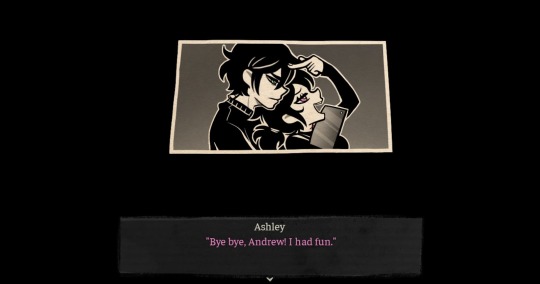
This scene says a lot. It's the most heartbreaking scene in the game, if you ask me, and probably the single most profound and well-written moment in the entire story. I could write a whole 2000 word essay on it alone, but I've already said most of what I have to say about it through what I've said in other essays, so I'll spare you all that. Instead, I'll use it to highlight something:
"I had fun."
Their dysfunction is fun to her. She's so used to abuse and alienation that even the most awful, stressful (as far as we know) route of the game is still fun to her. And that's not a sign of her being a secret evil sociopath or whatever; that's actually not abnormal behavior to develop for a lifelong victim of abuse. Those highs and lows, those strong emotional highs and lows are -addicting-. They're -fun.- Part of why abuse victims get into so many abusive relationships is because it's easy to pick up on those patterns of thought and take advantage of them, and the cycle of abuse is often furthered when a victim of abuse tries to draw out mutually abusive behaviors in someone with no interest in having that kind of dynamic.
This is where I'm willing to acknowledge Ashley's manipulative tendencies. Not just as a matter of controlling Andrew for its own sake, purely out of jealousy or possessiveness, but as a matter of trying to further the only dynamic she's ever known in her life. Better the devil you know, right?
That push and pull- that emotional rollercoaster- is all many of us know. And it's all Ashley knows. This dynamic is something she's so used to that she reacts incredibly harshly to any attempt to change it, because she doesn't know that things can be better. Because of this, she refuses to engage with who Andrew really is, and tells herself- and him- that she *hates* Andrew:
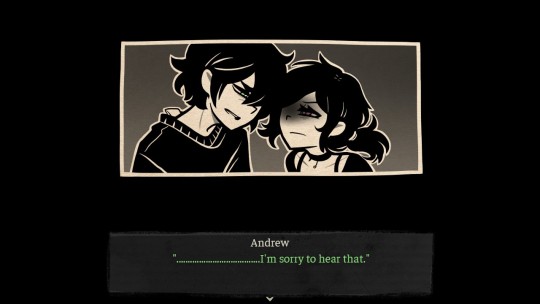
This scene is almost as heartbreaking as the above one in a lot of ways.
Andrew putting his foot down about the Andy/Andrew name dichotomy wasn't arbitrary and it wasn't just about his comfort. It was about Andrew giving a clear indication about what needs to happen for their relationship to improve. He's recognizing the cycle between them and wants to put a stop to it, because he's confident that things between them CAN get better and evolve into something healthier. Ashley, not understanding that their dynamic can get better, because their "fun" little push and pull of abuse is all she knows, rejects that. She rejects the unknown, and says- in Andrew's mind at least- that she'll never accept that new dynamic, nor will she accept who he really is.
Ouch. No wonder he looks so sad in that screenshot.
They have a conflict of understanding here, and I think it's fair to pin most of the responsibility on Ashley. Andrew was clear in what he wanted, and Ashley just... Didn't. She didn't see the importance of it ("...whatever that means in practice") and didn't really ask. This gap in communication, perfectly displayed in this scene, is likely what causes the Decay ending. He wants things to be better, and wants to treat Ashley better, and whether or not he understands the ways in which she communicates with him is in part what determines what he sees her as.
But there's a lot of evidence that he always wanted things to be better, that he always wanted to treat her better. But external factors have made it very, very difficult, and I think there are two key points in which he started to shed the importance of those external factors and seek that better relationship, both of which happening in the apartment: The killing of the warden and the 302 lady. In the first case, he was forced to do it to protect Ashley in a way he hadn't done before, or depending on how you look at it, since the death of Nina. But the intentionality was the key point here. After this point, he calls Ashley Leyley, which may or may not seem important at this point, but it's something I'll draw attention to later, so keep that in mind.
Next is the killing of the 302 lady, which is the much, much bigger point. We don't learn much about it until later on- as at first he just gives an excuse about the nail gun that doesn't line up with what we see on the map- but during the dream, it's revealed it was a calculated, intentional killing that he did to make sure there was no evidence left behind, and because Ashley (supposedly) would've wanted him to do it anyway. I say supposedly because Ashley herself doesn't seem to ever want Andrew to kill for her past Nina's death, because he only ever kills for her to defend one or both of them. If you want more evidence that violence for violence's sake isn't something she wants, look at this part in the final dream:
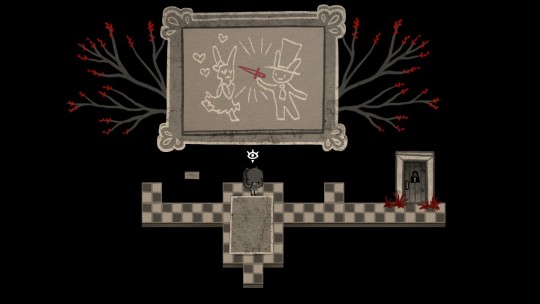
A knife isn't what opens the door, despite it being placed on the ground in that very map. While it seems obvious that the knife (violence) would be the key to solving the puzzle, it's put there explicitly to show you that it isn't. It's not what she wants; what she wants is a flower.
So, why is this important? Why am I centering Ashley- again- when this essay is supposed to be about Andrew?
It's because these two killings are when Andrew's self-delusion over who he really is starts to break down. It's still there, mind, as he still relies upon Ashley as an excuse to justify it, but, as well as what I've said before, the name ultimatum is an implicit confession that the normalcy he finds comfort in is starting to lose its grasp on him. There's a lot that's been said about Andy being something close to a "moral impulse" for Andrew, given his child self's reaction to Nina's death being the only thing he does that approximates a normal moral response to his and Ashley's actions, but if you do think that- which I think is a reasonable thing to think even if I don't necessarily agree- there's something you must also keep in mind:
-He- is the one who doesn't want to be called that anymore. -He- is the one who wants to let that moral impulse go, and Ashley is the one making it difficult.
That reading is assuming that Andy is a moral impulse, which I think is... either wrong or too simplistic. Every time I see that reading, it's from someone who's trying to paint him too sympathetically and absolve him of most moral responsibility. I also find it infantilizing to equate morality with childhood in such a way? But that's another tangent that I didn't sign up to talk about. What I do think, however, is that it's a useful framing device to display his own relationship with morality; the allegory to his child self doesn't have to be there for the general pattern to exist.
When Ashley starts to grill Andrew over the killing of the 302 lady, he gets mad. Very mad. Ashley sees it as pointless, as him covering his own ass, but he genuinely did it for her sake, because he thought that's what she wanted, and that it'd make her happy. But what makes her happy isn't violence- or any similarly extreme action for that matter- it's attention and validation. Something he's always reluctant to give her, despite the fact that he always chose her over the alternatives. But despite making that choice, it's always empty and meaningless, because in Ashley's mind, he never did it for her sake.
And hoo boy, does he not like it being framed like this.
He is perfectly willing to do whatever it takes to keep them happy and safe... but only for her sake. It has to be for her sake. He still needs that traditional role, and he still needs to have a narrative in which he's the good guy- a protector. Because it can't be for his sake. It can't be because that's what he wants. He has to uphold that romantic (in the literary tradition sense) ideal. His darkly romantic idealistic streak colors many of his actions and beliefs. This is most plainly visible in his quip about a double suicide being romantic, but it's also visible within the symbolism present within his dream, such as how he can only pave his own path in blood unless Ashley lights the way. It's visible within his appreciation for poetry, and it's visible with how the cultist within the dream speaks in Shakespearean English.
But the transient nature of this ideal is also revealed within this dream, because there's never a cohesive, guided path, even with Ashley there to light it up. Contrary to Ashley's dream, where you literally have maps showing you where to go, Andrew's dream has many more dead ends and no map to guide him. The symbolic role he acts out gives him no clarity, and there's no overarching narrative; merely a bunch of disconnected symbols.
This is contrasted with Ashley's dream, which has narratives so clear that the story literally gives the dream an episode title.
In a sense, he wants to view himself as an actor acting out a role in a story. He wants his life to be poetic, to represent something greater, and to have a cohesive narrative. This is why he's so disconnected from his true desires: He's more concerned with acting as a representative of an ideal than a person with agency. But every time the mask drops, every time he stops acting, his true self becomes visible. He naturally settles into being comfortable around Ashley, in treating her with warmth and kindness, and their banter becomes much less toxic. As intent as he is on acting out his role, it does nothing for him, and as his dream sequence shows, it doesn't even form a cohesive narrative, because he can't act one out. It's too contrary to who he really is, and what he really wants. But that idealization doesn't just apply to himself, it also applies to Ashley. Specifically, who Ashley is, vs who he wants her to be.
In his unique dream sequence, he sees two versions of Ashley; the child version of her- Leyley- and the adult version of her- Ashley. And the differences in the ways he interacts with the two of them are stunning. Leyley is an obstinate, annoying child. She's the one he NEEDS to take care of, and he hates that. He hates Leyley for what she did for his childhood. He hates that he needs to provide for her. He has the option of trying to kill her, even, over something as small as a candle!
But in the room with all the murders, the gilded cage, he sees Ashley as an adult. This version of Ashley is stuck in a closet that he himself has to open- and to choose to see. Their interactions are calm and friendly. She teases him a bit, sure, but she's still helpful, and they have fun together. He doesn't need her, and she doesn't need him. He needed Leyley- needed the candle- but here, there are other limbs strewn about for him to take. And, crucially, he doesn't even have the option to kill this Ashley for one of the limbs.
And during the choking scene, he lets her go the moment she acknowledges that he doesn't need her anymore. This is the first time we know of that he seems comfortable enough to set a clear boundary, which is acknowledging that their prior dynamic is dead and that they're now Andrew and Ashley, not Andy and Leyley. It's a bit late to express a clear boundary -after- literally acting like he was going to kill someone, but it's the first time we know of that he sets a clear standard for what, in his mind, would improve his relationship with Ashley.
After all, what he wants is to want her, not need her. He wants Ashley for Ashley's sake. Not for what she can provide him. He doesn't even need her for sleep, he just wants her. But Ashley has trouble acknowledging this, because he's never before shown that WANT. Only a NEED. She keeps trying to find ways to make him need her, because she's never seen what his desire for her is really like. She's only ever seen him desiring someone else, someone other than her.
She's only ever seen him as Andy, because she's never truly seen Andrew, only the violence he can inflict on others. But Andrew can see both:
He can see Leyley, the needy, bratty child who always needs his attention, that he needs to provide for. The one he hates and wants to get rid of. The one he kills for to protect.
And he can see Ashley, the one who engages in friendly and cute banter with him. Who comforts and shows him physical affection. The one he loves. The one he kills for to make happy.
He just can't choose which one he wants to see. Every outside influence- from his parents, to Julia, to Nina- makes him see her as Leyley. Ashley herself makes him see her as Leyley too, whenever she brings up all the things he did for her, and calls him Andy, his child self, instead of Andrew, his current self. And as long as he sees that child, he feels like one too, and can never give Ashley anything that comes from the heart.
But he really, really wants to see Ashley as an adult. He wants to take pride in her, how much she's grown, and how driven and competent she really is.

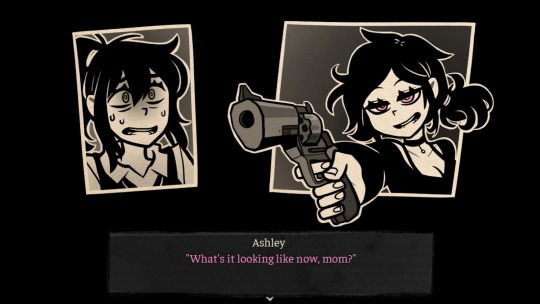
But god damn, does that bitch ever make it hard, because there IS no real difference between Ashley and Leyley. She's grown and changed over time, taking more adult (and stereotypically feminine) responsibility upon herself, but the fact that her temperament and personality hasn't changed much obfuscates that growth. When you talk to Ashley in the closet during the dream after getting the limb, Andrew asks Ashley to come out of the closet, but she refuses to come out because he won't invite Leyley over to play, which is a pretty strong metaphor for how he interfaces with different aspects of Ashley's personality and refuses to accept others. But the reality is that he needs to accept both, or rather, see her whole self as Ashley, rather than just the parts he likes.
In the end, it's him who has to make the choice how to see her. Ashley can only see what she's been shown, but Andrew can choose.
And in the basement scene, he makes that choice.
If Ashley refuses to leave him alone with their parents, that's it. In one of the most critical and important moments of his life, she couldn't give him the space needed to make up his own mind. She couldn't treat him as an adult. She couldn't see him as Andrew. If she does give him that choice, she chooses to acknowledge that Andrew is an adult who can be trusted to make his own decisions, even though she (perhaps foolishly) believes that this choice lines up with her own interests. And frankly it does either way, but in accepting their mom's offer, her chooses to see her as Leyley once and for all. He chooses not to reciprocate what Ashley showed him. He does it because he needs to, not because he wants to. Because it's his duty, not his desire.
This is what results in the Decay ending. Through his inability to see Ashley as an adult, he surrenders his agency and views all of his actions as an extension of his responsibilities, his role, which he no longer wishes to uphold. He dissociates fully from who he really is, acting in accordance with that disconnected, barely-cohesive narrative that exists only within his mind. The game starts to resemble the heartwrenching tragedy that many seem to take for granted that it is, as their dynamic fully doubles down on its painful toxicity. And, in an example of a poetic book end, Ashley's dream shows a double suicide, closing the book on their tragic tale.
It's tragic. It's heartwrenching. It's poetic. It's beautiful.
...Except it's not. Not at all.
It's actually fucking stupid, pointless, and brutal, and Burial shows us that. When we view their spiral as beautiful, we project the same darkly romantic ideal that Andrew possesses onto the story.
But the actual reality is horrifying.
Ashley spends most of Decay terrified of Andrew, the one person she found comfort in. He acts cold, distant, and aggressive towards her, showing pointless cruelty instead of any warmth. All she wants is comfort; all she wants is to not die. She doesn't want to engage in this death spiral at all, and, in her dream sequence, shows none of the same willingness to die alongside Andrew that Andrew does with her. The moment we stop focusing on the end of the Decay dream sequence, which has very striking imagery, and if you choose not to shoot, one of the most beautiful scenes in the game, we can see it for what it really is:
A scared animal running away from a predator.
The moment you see Decay through Ashley's eyes, and not the perspective of some romantic ideal, Decay becomes terrifying, tense, and painful. There is no catharsis to be had in this tragedy. It's easily avoidable as long as Andrew chooses to engage with reality, and not the empty promises of his mother and incoherent narrative of his ideal.
Finding beauty and meaning in tragedy is how we cope with the harshness of reality. But there is no coherent narrative to the tragedies we experience, just like there's no coherent narrative to the ideal Andrew wishes to uphold. It's something we create- that he creates- but it's not something that actually exists.
And when Andrew casts aside his desire for that ideal, and the responsibilities it shackles him to, it grants him clarity that he never had before. He sees the world for how it really is, and acknowledges that nobody- the least of which their mother- is as different from Ashley as they pretend to be.
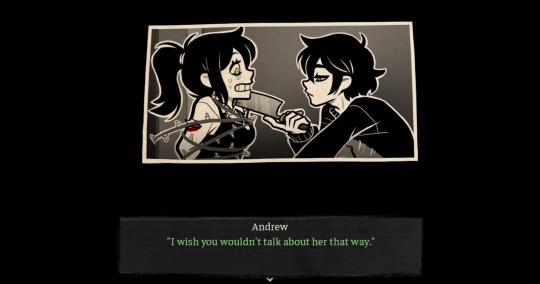
They're no better than her, and he's tired of people pretending that they are. People are all the same, no matter what ideals they try to uphold and represent. They still sacrifice others in the name of advancing themselves, still punch down whenever they can, and still lay blame on those beneath them rather than try to take control of their lives. They just use those ideals to justify themselves, but Ashley, and now Andrew, reject even the need for that justification.
This is why I believe the story is nihilistic. Not in that it asserts the inherent meaninglessness of life, but in that it grapples with the ideals we uphold and how they obfuscate the reality of the world we live in. The story, intentionally or not, highlights how ideals are often but a pretense we use to justify what we were likely going to do regardless, and how holding to them too strongly can lead to our ruin- and how monstrous they make us look to those who do not share them.
Consequently, this is how I view the part of the fanbase who thinks Decay is a good ending.
(the characters themselves represent existentialism rather than nihilism but i couldn't really fit that analysis in here without it feeling forced so i might cover that another time)
From that point on, their relationship becomes a lot more friendly, lighthearted, and playful. They ironically start acting more like children, but to quote CS Lewis:
"Critics who treat adult as a term of approval, instead of as a merely descriptive term, cannot be adult themselves. To be concerned about being grown up, to admire the grown up because it is grown up, to blush at the suspicion of being childish; these things are the marks of childhood and adolescence."
He's not ashamed of being playful with Ashley, or showing affection towards her. He's grown up. He finally sees her, and himself, as an adult- although he still doesn't show that in full until much later on (more or that later). But in Decay, he still sees her as a child, and to an extent, probably himself. Let's compare the ways in which he reacts to being called Andy. In Decay, he lashes out at Ashley and gets angry, even threatening her. But in Questionable Burial, he calmly says that Andy is dead and doesn't need Ashley's comfort, but still tries to reassure her that she's still needed. He's not ashamed of or hostile towards their prior dynamic, because he's grown past it. He still acknowledges Ashley's need to feel needed, but here, he recognizes its importance to her, whereas he was hostile towards it before.
It's a display of respect towards her feelings.
This interaction doesn't happen in the Sane ending, however. He doesn't play games with her and is just a lot less fun to be around all together. Why is that? Because he still hasn't yet shaken viewing Ashley as Leyley there. He still views her as a burden, as someone who needs taking care of. He's calmly accepted that, too, mind you, but he lacks respect for her because she's still a child, in his mind. But in Questionable?
The vision did more than just make him extremely embarrassed and lay his deepest desires bare. It forced him to recognize Ashley as an adult. When choosing between "Never" and "Never say never," if Never is chosen, the burden of thought is lifted off of him. But if Ashley chooses "Never say never!", he has to reckon with the fact that Ashley is an adult, someone who can consent to those kinds of things. Someone who MIGHT. Someone who has agency, and can make her own decisions. And more importantly… someone who can trust him to make his own.
Whether he desires sex or not is secondary; he's always had those feelings and has always been ashamed of them. But now that the part of him where that shame came from is dead and buried, there's no childish impulse to grow up. There's no attachment to the hate and bitterness he had before. Look at what he worries about when he picks up that she's uncertain or confused about who he is now:
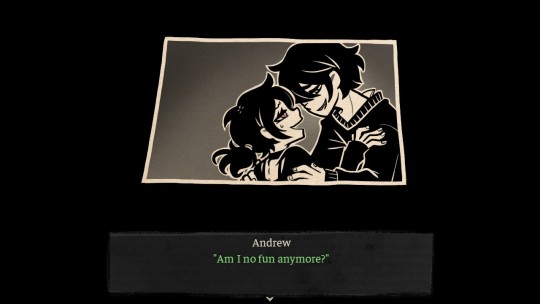
It's her feelings.
He wants to be fun to be around. He wants to make Ashley happy. He loves her, and not as a romantic interest or even as a sibling. He loves her independent of all that baggage.
He loves her as a person.
Their relationship runs contrary to societal ideals in some pretty huge ways. So contrary, in fact, that it's hard for some to accept it as anything good, that it can ever be best for the people involved. It's incestuous. It involves them killing and eating their parents. It involves them distancing themselves so much from society that it's hard to believe they'll ever fit in it again. It's chaotic, it's messy, it's codependent, and maybe even toxic. And yet, here they are. They're coexisting. They're happy. They're healing. They're navigating the world in the only way they can: together.
Meanwhile, in Decay, Andrew refuses to allow himself to get closer to Ashley. He surrenders all agency to her, buys into his own narrative, drinks his own Kool-Aid, and may or may not condemn one or both of them to death in the process. Like it or not, the only path where Andrew takes ownership of his life is the one where he's closest to his sister. It's the one where he decides where they will go next, the one where he decides his own feelings matter, and acts in accordance with what he wants instead of how he thinks he should act.
His agency, his freedom, and his growth don't happen in spite of his codependency; they're happen because of it. They can't grow alone. They can't heal alone.
In reading the story, one must interrogate how important those societal ideals are in the face of the realities of what makes people happy. Are those ideals worth upholding in spite of this? Can we really allow people to fall through the cracks in the name of social norms? Can we blame people for taking rash actions when the social contract has failed them?
Or are we so blinded by those ideals that we can't see that people can be happy while blatantly disregarding them?
All I know is that in Burial, Andrew, having cast aside normalcy, now appears to be truly happy for the first time in his life.
Who are we to take that from him?
199 notes
·
View notes
Text
I've been meaning to make this post for a while, and a few others provided some similar insights recently (this being one of those posts) but: in actual play, and fiction generally, just because a character feels a certain way does not mean it is generally true.
The example I had in mind is Keyleth and Vex's feelings towards the Raven Queen as covered excellently in this post. It's extremely valid for them to feel that way; it does not mean they are objectively correct about what happened. It is easier to blame the Raven Queen than to be mad at your dead brother or partner for devoting himself to a cause; it's even easier to blame her than Vecna because the party was so used to defying death, and because Vax did come back temporarily from that (via the Raven Queen). But this is a very fair, if not necessarily overly merciful, agreement, into which Vax entered voluntarily and repeatedly was asked for - and gave - his consent.
This is something we see at times play out in game - I don't know if forgiving is the word, but Beau is much more willing to consider that perhaps her father had a point before seeing him months into being with the Mighty Nein and having supportive friends and mentors. Her view towards her father makes a lot of sense, but it is ultimately her extending good faith that we learn immediately is undeserved. Ashton's belief they should take the shard is another - it was pretty clear to the audience that this was something they'd been extensively warned about but it makes perfect sense that given their personal experience, they would. And then it blows up in his face, but it still makes sense that he would have made this choice.
It's deeply irritating when fans of a work say "why didn't the characters act in a perfectly logical way that includes all the information I as a viewer know that they might not be privy to and discounts their biases and emotions", but I think fandoms are relatively aware of this flaw. What I'm talking about is a reverse of that: fans looking at characters acting with all of their biases and emotional baggage and lack of complete information and saying "see! This character agrees with me therefore I must be correct in some objective sense."
#cr tag#you can spot this pretty easily btw#i'm watching the people who were like LAUDNA'S RIGHT WHAT ABOUT THE TITANS throw her under the bus bc she changed her mind#bc if you treat characters not as figures within the story to engage with but as mouthpieces...gonna have to jump mouthpieces
83 notes
·
View notes
Text
I went to the Apple Store yesterday to try the scripted demo of their VR headset. My overall impression is that it's the best possible execution of what might be a fundamentally flawed idea.
The passthrough video is pretty incredible. It's somewhat dimmer than reality, and the color accuracy is just OK, but it's more than good enough to feel like you're looking through clear displays at the real world. I'm told the passthrough on the Quest 3 is even better, but haven't tried that and can't comment. One thing is that there is a weird motion blur effect when you turn your head, I'm not sure if that's a display tech limitation or introduced deliberately by the software as a workaround for a different display tech limitation.
The resolution is 4K per eye, which, as mentioned, is more than enough for a powerful sense of presence in the real world. One of the nifty bits of the demo was when you turn the dial to tune out the world and suddenly you're sitting by a mountain lake, and the feeling of actually being there is overwhelming. The dystopian implications of needing a VR headset to sit at a mountain lake aside, it would be cool to have one just to have your office be anywhere you can imagine. Not $3500-before-tax cool, but cool.
Wow sports leagues are going to love this thing. I don't give a shit about sports and even I was thinking, "If the NBA put a stereoscopic camera courtside and sold you games for $50 a pop, I'd absolutely buy that"
But 4K per eye is not enough to do work, not even close. The experience of using normal computer-y applications on this was not unlike plugging your laptop in to a TV that's at the normal TV distance. You can do it, it works, but it's not anyone's preferred way of working. Text is amazingly legible, but only at sizes that are equivalent to having a single webpage take up your entire 4K monitor at normal monitor distance.
It is not particularly comfortable. Part of this might be that the store demo makes you use the "catcher's mitt" strap, which only goes around the back of your head and so gravity has to be countered only by the pressure of the thing against your face. Reviewers have said that if you use the other band that goes over your head the situation is better, but still.
A lot of early comments were making fun of Apple for having the battery be an external thing you put in your pocket and attach with a wire, but I think that's just fine: we all walk around with giant batteries in our pockets anyway, and anything you can do to have less weight on your head is a Good Thing. But then Apple took all those weight savings and spent them on making the stupid thing out of metal and glass instead of polycarbonate. It's nuts! It's like if you made a car that was 500kg lighter because you invented magical tech for keeping the engine somewhere else, and then went "great! with all the weight savings now we can build the body out of lead". Apple, you don't need to fear plastic. Plastic is good! Plastic built modern civilization.
You control it with a combination of eye tracking and pinch gestures. This is the main piece of evidence of my "best version of a bad idea" thesis: it works really, really well; so well that I can tell this is probably an evolutionary dead end. It's just fine— miraculous, even— for dragging windows around and doing the basic stuff the in-store demo has you do. It's amazing that you can more or less have your hands anywhere, including on your lap, and the recognition works perfectly (by contrast with the HoloLens I tried 5 or so years ago where the gesture recognition was total crap). But it's immediately obvious that you can never do serious manipulation of your computing environment with this.
The takeaway is that it's incredible for passive consumption of specifically-made media, assuming that ever exists at scale. But it will be a long time before we're gogged in like Hiro Protagonist to do our office jobs this way.
167 notes
·
View notes
Text
The Sakamakis perfect match in: Game night
From author: This is a new series I'll be doing where I pair up the Sakamakis with their perfect partner for specific scenarios, so if you have any asks, feel free to send!
Shu Sakamaki
🎻- Frankly, Shu is a lazy man child whose only purpose on earth is to drive you up a wall
🎻- He needs someone competent that can carry your team for the BOTH of you because God knows he won't
🎻- Shu finds that getting a reaction out of you far more interesting than the game itself
🎻- So let's say you're playing Uno, he has five +4 cards up his ass and he's only willing to spend them on either you or Reiji
🎻- The truth is, when you're good at everything, no challenge is ever truly a challenge and that makes life soooo boring especially if you're immortal
🎻- Anyways, Shu would be best matched with someone that would try their best at any given game, especially if they're competitive
🎻- He also needs someone that's a major crash out and tweaks tf out when he ruins the game for them
Reiji Sakamaki
☕️- Reiji definitely needs a team player
☕️- He needs someone strategic and communicative so they can conspire together on ways to win
☕️- Here's a hint, he's open to blatant cheating if you do it in such a way that it doesn't technically count, except it so does
☕️- For example, you're all playing Monopoly. You offer to buy Ayato's property in exchange for yours except you KNOW that it's in between both of Reiji's properties, and the chances of him landing are extremely high and you and Reiji are in kahoots together so you both split the profits
☕️- See that's not technically cheating, that's playing smart
☕️- Reiji's best match would be someone who's competitive but also cunning. Ooh and never let him feel like you're the one in charge, he'll go crazy
Ayato Sakamaki
🏀- Well uh
🏀- He would want someone as arrogant and competitive as him, but is that what he needs? Absolutely not
🏀- Ayato needs someone level headed that can help balance out their team dynamic in order to win
🏀- He needs someone that'll see the flaws in his mistakes and take accountability for HIM because I have no idea if you could even convince him he even made a mistake in the first place
🏀- In short, Ayato needs someone to save that burning ship he's on
🏀- You need to be in control without specifically admitting you're in control, you need to be sneaky about it and make it seem like HE'S the one who came up with those ideas
🏀- The best example I can think of is when you're playing pictionary, you whisper something REALLY close to what the actual thing is and have him come up with the answer himself
Laito Sakamaki
🃏- Laito's best match would be someone who's a bit laid back and playful
🃏- While we all know Laito's extremely smart and can read people well, we need someone to bring out that side of him rather than takeover and never have him put his skills to use
🃏- He needs someone that'll force him to take the lead otherwise everything would just be a big joke to him and unless it's a game he likes, he genuinely does not care
🃏- You need to kind of be a Shu in this case
🃏- What I mean by this is, you need to tease him a bit, make him feel just the inciest bit insecure about his game skills. Tease him, make jabs at him, play mindlessly into the opponent's hands
🃏- Hmm this example would best describe what I mean. Imagine you're playing a game of Ludo and you roll a six and instead of moving your piece out of the way before it gets "eaten", you choose the option to unlock another of your pieces to the game. He goes nuts after your like 3rd time of this and subtly starts giving advice despite cussing you out in his mind
Kanato Sakamaki
🧸- Someone patient for sure but also extremely determined
🧸- You need to essentially gentle parent him to the finish line
🧸- Don't get mad at him when he makes a dumb move but let him scold you because you did
🧸- Kanato would work well with someone that's headstrong and has a clear view of victory. He needs someone he can trash talk the other players to, regardless if they're his brothers or not
🧸- Aside from him being batshit insane, he'd be a fun person to play with. He's smart and calculated in the emotional aspect of the game and he can read his players really well
🧸- He knowsss how to get under their skin and might even have a freak out if someone calls him out. Of course none of it is real, but what the others said DID hurt his feelings (just maybe not to that extent truthfully)
🧸- Kanato would work well with someone willing to put up with his antics, someone who's patient and well versed in the game they're playing
🧸- The only example for this scenario I can think of is imagine you guys are playing checkers or chess and Kanato stands behind you while outwardly critiquing your opponent's every flaw and making disappointed noises and distracting them purposely
Subaru Sakamaki
🥀- Similar to Kanato, he needs someone patient
🥀- Obviously his anger will be an issue, but you also need to be smart to be able to point out the flaws in his moves and communicate to him ways to win
🥀- See Subaru would pair great with someone that can tell him what to do clearly and precisely
🥀- You need to be the brains to his brawns, you need to think and act quickly
🥀- You also need to shit talk his brothers with him
🥀- Maybe they made a stupid move, why not try lightening the mood with some loud whispering about them
🥀- Subaru would act like he doesn't like the idea of game night, but by the time he has the dice in his hand, he's folded. And because of this, he needs someone that can have fun with him
🥀- He needs someone playful but yet a person that can lock in at any given moment
🥀- Even if you guys don't win, he'll make a comment on how fun it was in the end
🥀- Example wise, I can honestly only think of you guys playing Snakes and Ladders and you shake the desk while the dice rolls to give someone the exact number they need to get eaten by a snake and he's just in the background backing you up and vouching for you that you didn't do it, meanwhile he's trying so hard not to laugh his ass off
#diabolik lovers#diabolik lovers x reader#diabolik lovers x you#diabolik boys#ayato sakamaki#laito sakamaki#diabolik lovers laito#dialovers#anime x reader#diabolik lovers fandom#fanfic#diabolik lovers headcanons#diabolik lovers shu#diabolik lovers reiji#diabolik lovers ayato#diabolik lovers subaru#shu sakamaki#reiji sakamaki#dialovers laito#diabolik lovers kanato#kanato sakamaki#subaru x reader#kanato x reader#ayato x reader#shu x reader#reiji x reader#laito x reader
86 notes
·
View notes
Note
Why do you focus on 5e? Obviously your content can be used in any other rpg that can accomdate a fantasy setting but it's very clear you don't like 5e all that much, considering the amount of patches you make to fix flaws in its design?
Friend, I think you've misunderstood me: I love 5th edition, I love it the way nerds love objectively kinda bad genre shows or middleaged men love broken down sportscars that remind them of their fathers. Love in this instance manifests as a desire to improve, to iterate, to imagine a less flawed version of the thing and through my efforts bring that version into being.
5e is flawed, but it's flawed in JUST the right way for my brain to start surging with ideas about how it could be better, which helps me learn to be a better game designer/modder as I test out how those ideas could be implemented or improved upon. There's a baseline level of stuff I like for d&d (how adaptable it is, how easy it is to onboard new players, the particular level of mechanical crunch) that the otherwise flawed system makes a great canvas to work with.
What you might've caught wind of is my vendetta against Wizards of the Coast and their Hasbro overseers; if I could I'd crash into their studio, plunder the IP from their vaults, and run off into the night making feral goblin noises. My ire particularly focuses on the fact that in trying to produce a market focused product that appeals to everyone they refuse to actually make anything of substance, leading to the marvel-ification of my favourite game.
5e is the system that feels the closest to the ideal game of d&d I've been chasing for two decades, and when something comes along that better fits that ideal you can bet I'll jump to that. I'm really excited about the OGL crisis spawned games (daggerheart, mcdmrpg, tales of the valiant) and I look forward to seeing what direction they take the TTRPG space. If I don't end up preferring any of them, I'll likely end up up using 5e as a roseta stone to translate good game design ideas between them.
117 notes
·
View notes
Text
Why Ceroba and the Feisty Four were right
Not bothering with any fancy opening, it's exactly what it says it is: Ceroba and the Feisty Four were right to call out Starlo.
Now before you crucify me, I love Starlo as a character. But I'm tired of people (not calling out anyone in particular) pretending that he's done absolutely nothing wrong and demonize Ceroba and the Feisty Four for snapping at him (largely Ceroba, but I see the Feisty Four get shat on every now and then).
And this is not me calling Starlo a jerk. Typically, calling him a flat-out jerk would mean he did shit on purpose with malicious intent, and I don't think he acted out of spite. Rather, he did all those things because he just didn't think about it in the moment. I understand that, and I can 110% relate to that myself, honestly.
That being said, he did make some legit dick moves over the course of the game.
Exhibit A: Having Moray walk around with a snake in their boot and giving them rashes.
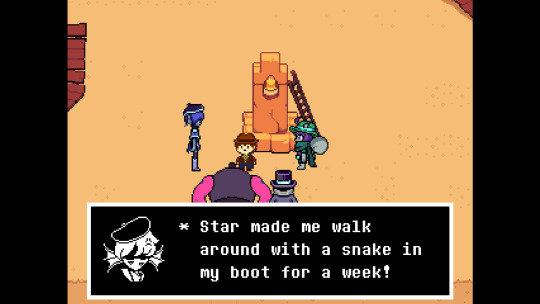
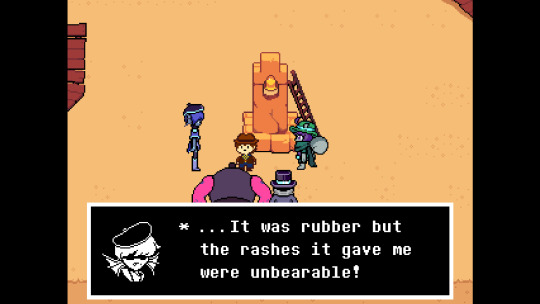
IK some of Starlo's more wild fans would probably do anything he says and all that, but put yourself in Moray's shoes (or boots I guess would be more appropriate). If your friend made you walk around with a rubber toy in your footwear that gave you a nasty rash, I think you'd be reasonable at least a bit angry at them.
Exhibit B: The Boulder Droppers
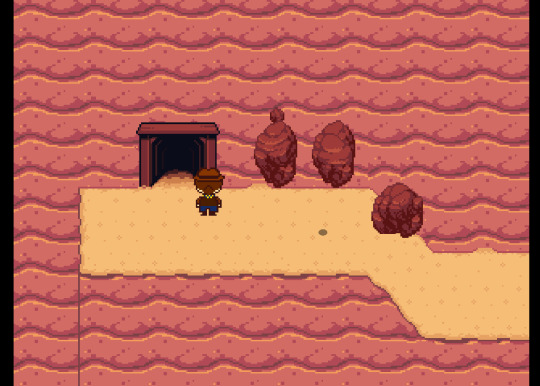
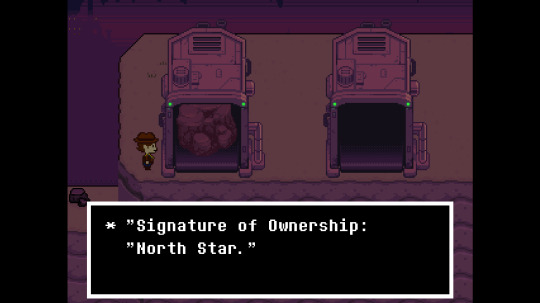
They're literal goddam boulders. That shit could've killed someone. Setting them up at a busy mineshaft is reckless enough as it is but leaving them on after you're done using them just makes things even worse.
Exhibit C: Blaming Clover for everything that happened and shooting them over it.
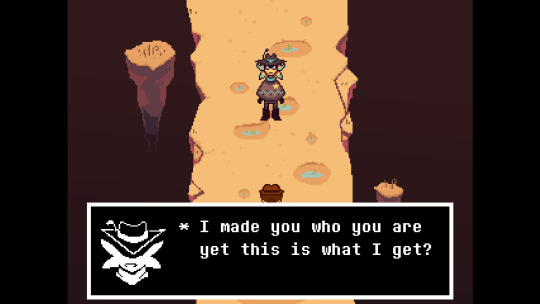
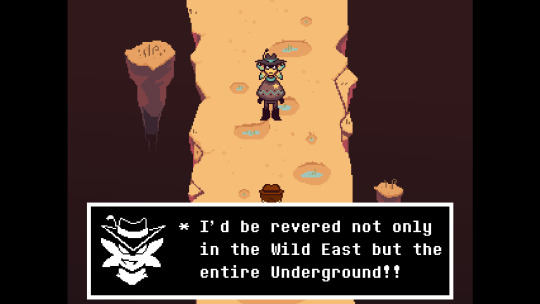
What am I supposed to say? If you hate Ceroba for what she did to Kanako and Clover, keep in mind that Starlo basically did the same exact thing.
Again, this is not me calling Starlo an asshole overall. Yes, he is a good monster deep down and just made some legit mistakes. But my point is, he does have flaws nonetheless and I can't stand people who ignore them.
Like, him accepting what he did was wrong and coming to terms with that is one of the best parts of his character! C'mon guys.
And yes, people treat Ceroba as a horrible friend because she wasn't into it and apparently 'hates that part of Starlo' or whatever.
If Ceroba actually hated Starlo's obsession with Western culture, do you think she'd indulge in his ramblings on humans?
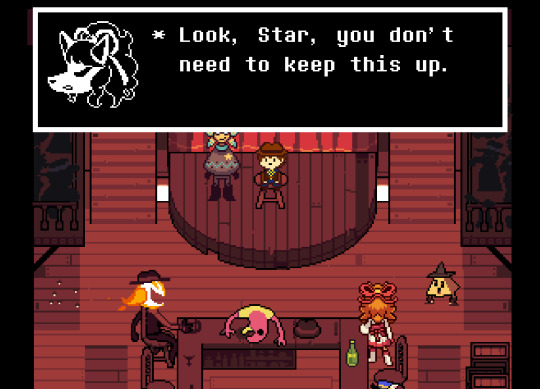
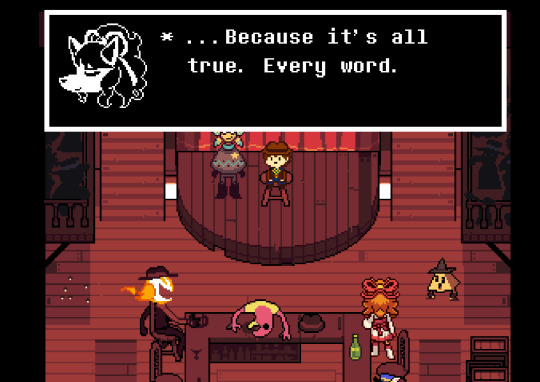
...or helped him set up all of those wanted posters for him?
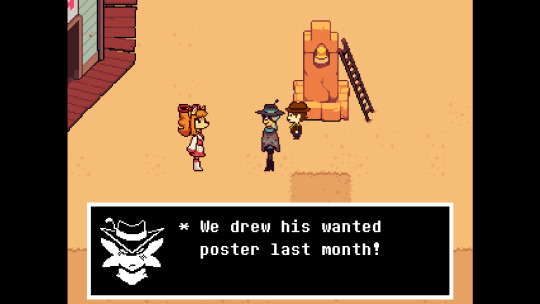
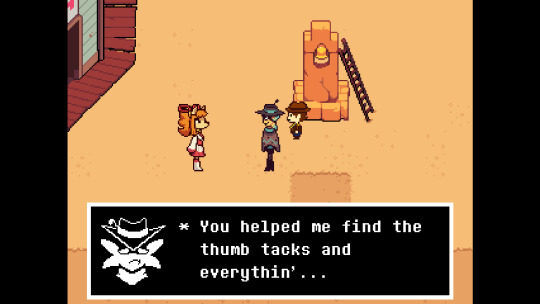
...or helping his family search for him when he 'goes missing' during a neutral run?
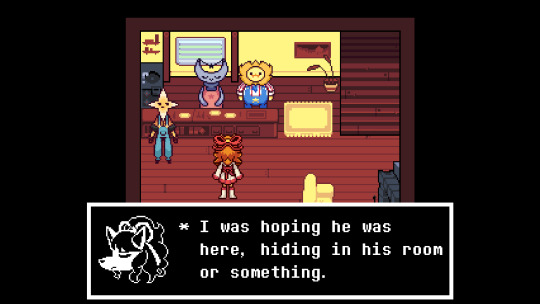

*sarcastically* Wooooooow, what a horrible friend...
Yes, I understand Ceroba is a very blunt and sarcastic person, but I think because of that, she ends up coming off as harsher than she means to be. Trust me, I can relate to that.
To call her a heartless bitch is a disservice to her character. She does care deep down, even if she isn't that good at showing it.
And hey, she's a mourning widow and mother, I wouldn't blame her for not being good at showing positive emotions.
As for the Feisty Five, our favorite enby fish puts it best themself:
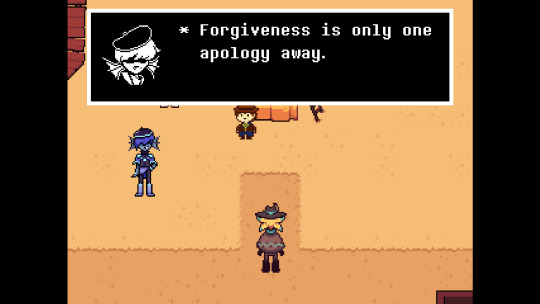
My point is, despite snapping at him, Ceroba and the Feisty Four did not hate Starlo. They understood that his obsession over Western Culture was really important with him. It's made clear that they know he's a good monster deep down, despite his transgressions and were very ready to forgive him.
They just wanted him to dial it back. And yeah, he needed to.
Granted, this is targeted at the 'Starlo did nothing wrong' crowd. If you admit that he's pretty heavily flawed but that Ceroba's done worse, I can accept that. Hell, despite me being a Ceroba apologist, I might even agree with you to a degree.
But I am a bit tired of the fandom putting him on a pedestal while overhating everyone who remotely criticizes him.
#undertale#undertale yellow#uty starlo#uty ceroba#the feisty five#uty ed#uty ace#uty moray#uty mooch#ranting#fandom critical
72 notes
·
View notes
Text
I feel for the Izzy fans, I really do. It sucks to have your favorite character killed off, especially when you feel like their death serves no narrative purpose. It genuinely hurts to lose a character that you identify closely with, and it's okay to be sad and grieve. The character might not be real, but the grief is. Let people mourn. Don't be rude to the ones who are just being sad in their little corners of the internet, yeah?
That said.
Some of the stuff I've seen in the OFMD fandom today? Worst shit I've seen in a fandom that I love and care about, and grief is no excuse. I know I'm a no one in this fandom and I'm mostly typing into a void, but I've got to get some things out:
The show doesn't deserve to be canceled. None of the creators, producers, or writers deserve to be canceled. Nothing queerphobic, homophobic, or ableist happened.
Izzy's death was not an insult or a cruelty or a targeted attack.
David Jenkins and the rest of the writers did not gaslight and abuse anyone (yeah, those are take I've seen).
It wasn't "objectively" a cheap or meaningless or badly-written death. You can hate it and that's okay, but that's still subjective!
Izzy was not the main character or the "heart" of the show. The heart of the show -- the show itself -- is Ed and Stede's relationship. We have been told as much.
"Ed hasn't faced any consequences for his actions." He has though? He didn't gaslight girlboss his way back into everyone's hearts. Izzy is not Ed's hapless and helpless victim. He was almost beaten to death and ran around in a penitence onesie with a catbell on; I think those were consequences.
"How do you feel when gay characters are randomly killed off to help a straight couple progress their narrative? Not good, huh? That's how disabled fans feel." It's okay to feel that way, but don't make any sweeping assumptions about disabled fans. I'm disabled and I'm gonna say that's not what happened here.
"How dare you kill off this character who's abused, flawed, suicidal, disabled, and queer!" Ed is still right over there, yeah? Check, check, check, check, and check. (Little note: I've seen a lot of "he's not disabled!" Even if you don't buy the kneebrace ((Ed Teach with bad joints is so important to me, shhh)), what about invisible disabilities? What about mental health issues? I'm not here to diagnose a fictional character, but it's clear to me that Ed has mental health problems that dramatically impact his life.)
"It's sick that Izzy died in the arms of his abuser apologizing to him." I don't even know where to start with this one, but I get the feeling that some parts of the fandom only consider physical abuse valid. Mental, verbal, and emotional abuse are pretty fucking damaging and I think it's sick that some folks think they aren't actually abuse.
People who enjoyed the last episode of season two aren't media illiterate. People who love Gentlebeard aren't abusive narcissists.
I just.
I really, truly feel for Izzy fans for I too have lost a blorbo. I'm giving a huge hug to the Izzy enjoyers who aren't out there making threats and calling everyone abusers and being outright hostile to anyone who had the nerve to enjoy this season. Like, I genuinely hope you guys are doing okay, and if you need an ear, I'm game.
#ofmd#ofmd s2 spoilers#cw: abuse#tw: abuse#i'm just frustrated and sad#fandom critical#day two: still bad#but i've seen some very cool izzy fans out there talking down their friends#as well as some kind and patient words from neutral parties#this fandom is still mostly good and kind#day three: i think we're doing better!#day four: backsliding :(#me typing things
202 notes
·
View notes